The Fed Fires Starting Pistol on Dollar Bear Trend, says ING, but Others Disagree
- Written by: James Skinner
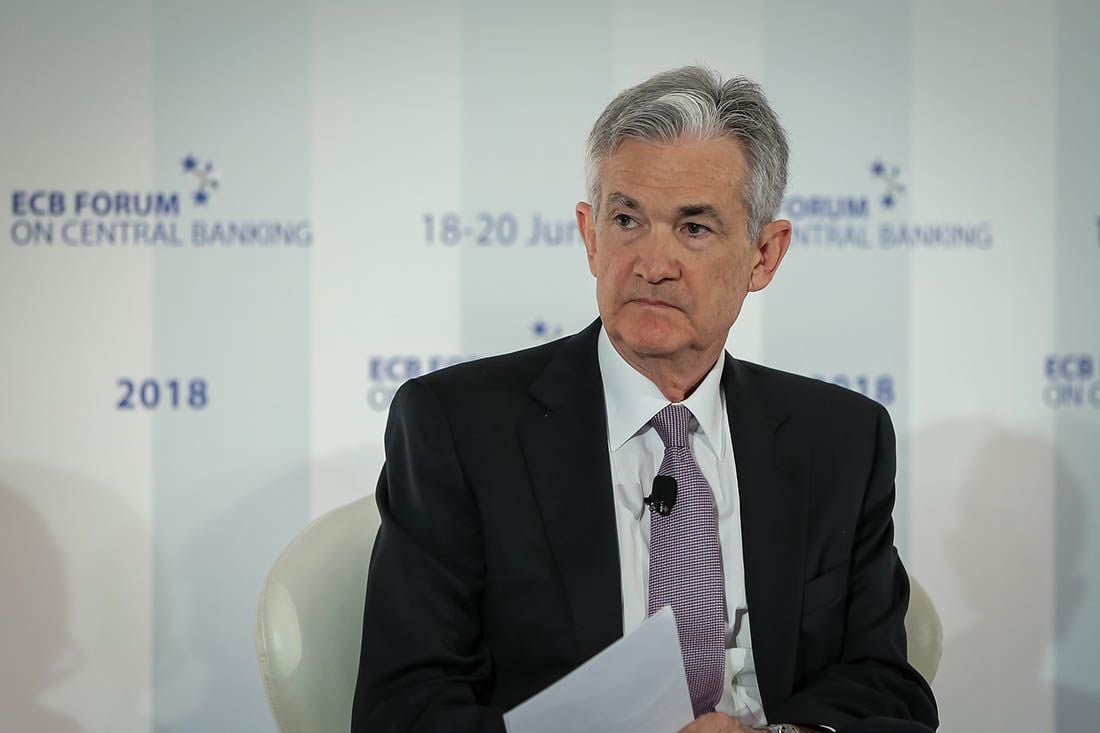
Image © European Central Bank
- Fed bows to yields to external pressure, signals rate cuts on way.
- ING Group says decision "fires starting pistol on Dollar bear trend".
- Commerzbank also looks for softening USD, higher EUR/USD rate.
- But RBC Capital Markets sees "high bar" for more USD weakness.
- MUFG says Fed move to only "constrain" USD upside from here.
The Dollar slumped across the board Thursday in response to the latest monetary policy guidance from the Federal Reserve (Fed), which strongly suggested the U.S. central bank could cut its interest rate before the year is out, vindicating some analysts for having bet against the greenback.
ING Group says the Fed has now fired the starting pistol on a multi-year Dollar bear trend that could ultimately see the gains realised so-far during the Trump presidency unwound, while Germany's Commerzbank is also forecasting more weakness ahead for the greenback.
However, not all analysts are on the same page as Japan's mighty MUFG, the world's fifth largest bank, says the change in policy guidance will simply serve to constrain further Dollar upside, while RBC Capital Markets analysts say the bar for more weakness in U.S. exchange rates is high.
Meanwhile, President Donald Trump had reportedly been exploring ways in which he could pressure Federal Reserve chairman Jerome Powell into lowering U.S. rates. Bloomberg News reported Wednesday that now the Fed has not done so, the U.S. President allegedly wants the chairman gone.
"Last night the Fed effectively announced the start of a fresh easing cycle and the dollar sold off across the board. Our team favour the first Fed rate cut in September, but possibly July if US data disappoints," says Chris Turner, head of FX strategy at ING Group. "We think USD/JPY is probably the best vehicle to express the view that the dollar is embarking on a multi-year bear trend."
Turner and the ING team forecast the USD/JPY rate will fall to 103 by end-2019, from 107 Thursday. Their forecast of a fall to 108 before the end of June has already been met this month.
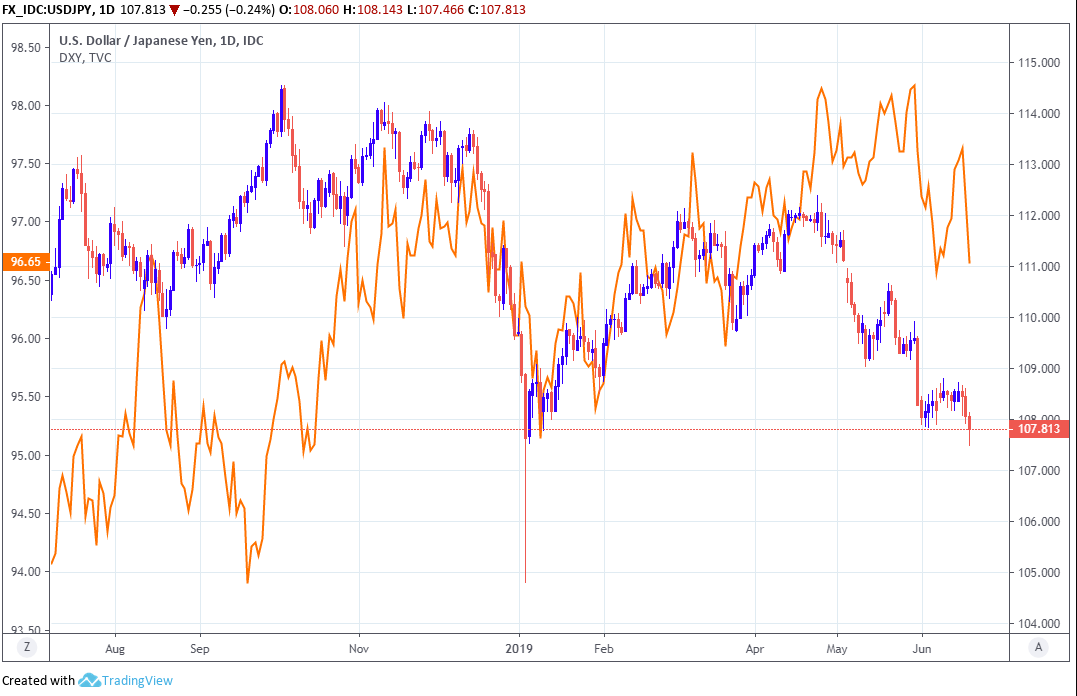
Above: USD/JPY rate at daily intervals, alongside the Dollar Index (orange line, left axis).
U.S. policymakers voted to leave the Federal Funds rate range unchanged at 2.25%-to-2.5% in June Wednesday but Chairman Jerome Powell, who's reportedly in line to be fired by President Donald Trump for not already having cut rates, signalled a sizeable reduction in borrowing costs is on the way.
The Fed went from describing the U.S. economic expansion as "solid" in May, to calling it only "moderate" in June's rate statement. It also acknowledged risks to the jobs market and inflation target have risen recently, in an assessment that drove a landmark shift in 'dot-plot' forecasts for rates over the coming years.
Eight of the 17 voters on the Federal-Open-Market-Committee still forecast that U.S. interest rates will remain unchanged for the rest of 2019, according to the Fed's so-called dot-plot, but another eight of them now expect one interest rate cut before year-end.
Just one FOMC voting members still expects an interest rate hike in 2019
Furthermore, rate setters scrapped their projection for an additional rate hike in 2020, and the dot-plot for that year now suggests U.S. interest rates will remain steady at 2%-to-2.5%. And these forecasts could all fall further still over the coming months if the U.S. and global economic outlooks continue to deteriorate.
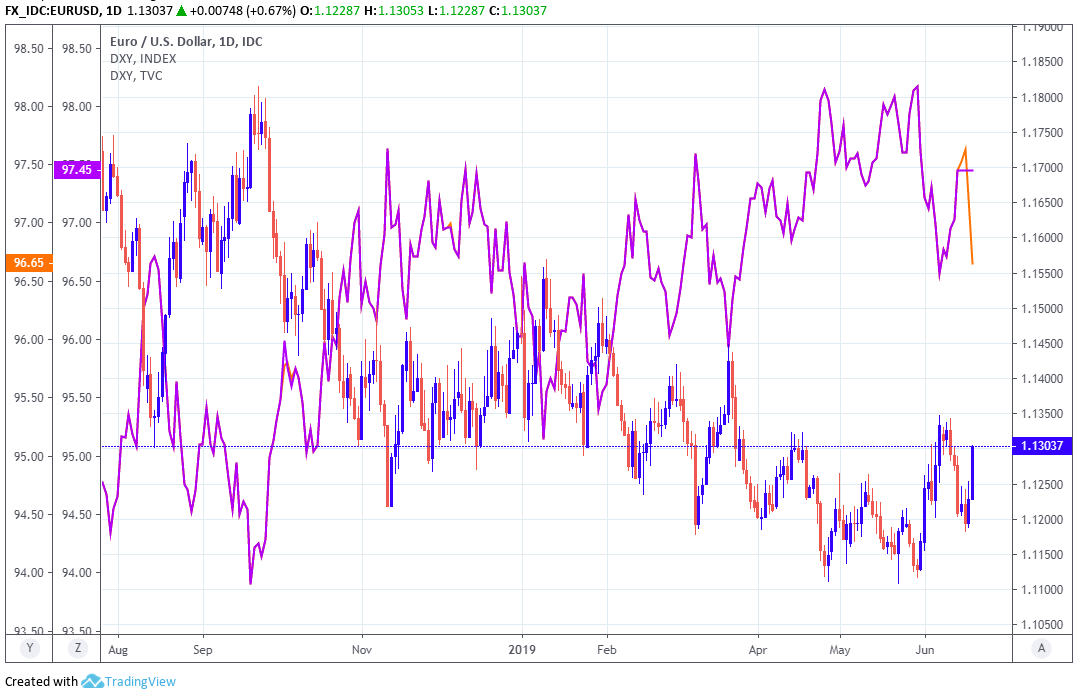
Above: Euro-to-Dollar rate at daily intervals, alongside the Dollar Index (orange line, left axis).
"This does not require a re-valuation of the EUR-USD exchange rate at this moment. What will now matter medium term is which of the central banks will be seen as the more active," says Thu Lan Nguyen at Commerzbank. "We still put our money on the Fed in that context, thus expecting a weaker dollar."
Commerzbank forecasts the Euro-to-Dollar rate will hit 1.16 before year-end, up from 1.13 Thursday, due largely to the Federal Reserve's likely interest rate policy going forward.
Changes in rates are only normally made in response to movements in inflation, which is sensitive to economic growth, but impact currencies because of the influence they have on capital flows and their allure for short-term speculators.
Capital flows tend to move in the direction of the most advantageous or improving returns, with a threat of lower rates normally seeing investors driven out of and deterred away from a currency. Rising rates have the opposite effect.
The Fed said last month that a combination of "moderate" economic growth and below-target inflation would mean it could be "patient for some time" before adjusting rates again. This came after it shifted to the sidelines of the interest rate field in January, telling markets it'd be "patient" before moving again.
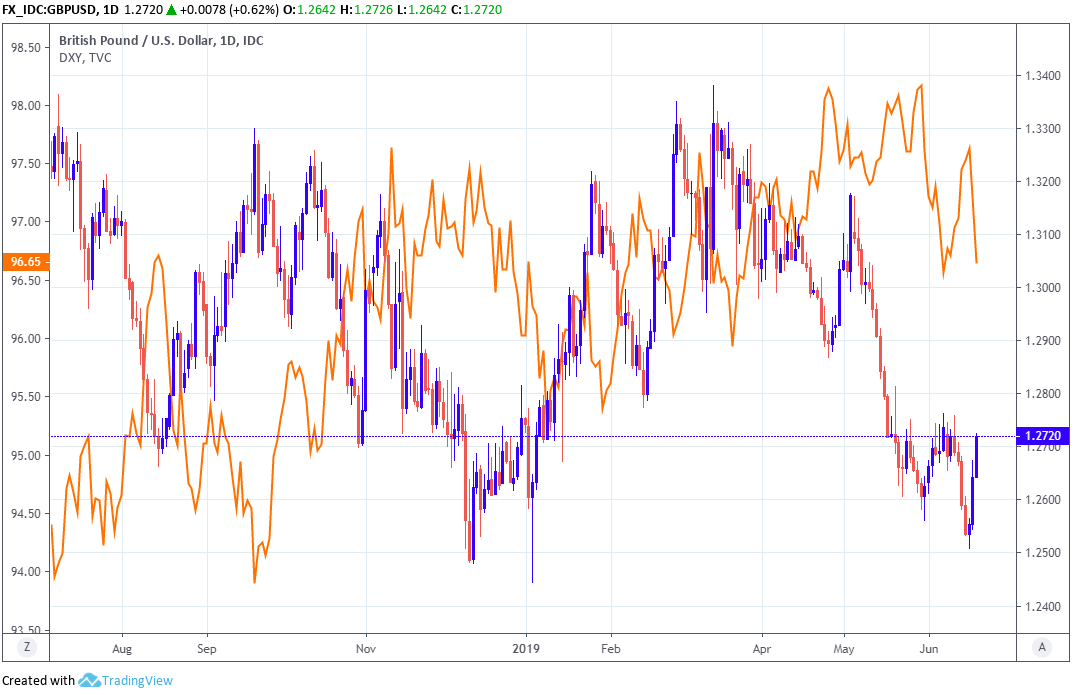
Above: Pound-to-Dollar rate at daily intervals, alongside the Dollar Index (orange line, left axis).
All of the above factors appear to be arguing for further U.S. Dollar weakness over the coming months, but some analysts see only limited downside while others claim there's still scope for further gains this year. Clearly, not all are on the same page when it comes to the outlook for the U.S. currency.
"It is probably fair to say that the Fed’s default position is now to ease in July and that the onus is on the data/G20 meeting stopping them. But with 32bp priced in for July and 75bp by year-end, the hurdle is high for further USD weakness from here," says Adam Cole at RBC Capital Markets.
Financial markets had been betting before Wednesday's decision that U.S. interest rates would be cut at least two times before year-end and they were undeterred from such wagers by the Fed's new forecasts from Wednesday.
Pricing in the overnight-index-swap market implied a Fed Funds rate range of between 1.65% and 1.9% ahead of the statement on Wednesday, which suggested investors were close to seeing three 2019 rate cuts as a certainty.
By 08:00 on Thursday, those bets against the Fed in the interest rate derivative market had increased further still, and dramatically, with overnight-index-swap pricing implying a Fed Funds range that is close to the 1.5%-to-1.75% level.
That suggests investors now see four 2019 rate cuts as being close to a certainty.
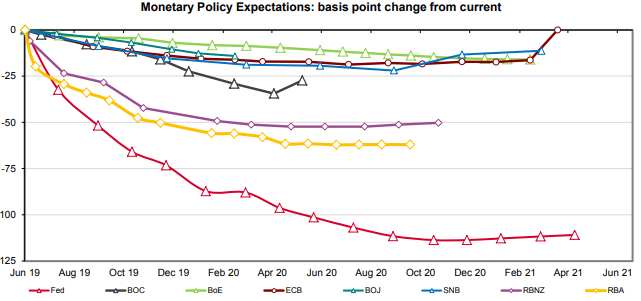
Above: Market expectations of G10 interest rates. Source: Westpac.
"Economic activity was now described as “rising at a moderate rate” rather than a “solid” rate. The FOMC still sees “sustained expansion of economic activity” and “strong labor market conditions” as well as inflation near the symmetric 2% target as their base case scenario, however they noted that “uncertainties about this outlook have increased”," says Lee Hardman at MUFG. "The dovish shift should help to constrain dollar strength going forward."
MUFG forecasts the USD/JPY and Euro-to-Dollar rates will remain close to their current levels until the end of September, although the Euro is expected to rise modestly to 1.15 in the final quarter and the USD/JPY rate is seen declining to 107. The Pound-to-Dollar rate is expected to end 2019 at 1.2850, a little higher than Thursday's 1.2720.
Financial markets had bet to some degree as far back as late 2018 that policymakers would be cutting rates before 2019 is over, due largely to expectations the U.S. economy would slow this year as the positive effect of President Donald Trump's tax cuts wears off.
However, the month of May brought with it some clear signs the trade war with China might now be hurting at least some parts of the U.S. economy, which risks compounding the slowdown that many already expected. Then the trade war also escalated further in May.
Some analysts and investors saw that inviting the shift in policy guidance that came Wednesday alongside a weaker U.S. Dollar. So far the shift has been delivered and the Dollar is in retreat, but the U.S. currency also fell modestly in the weeks after the Fed's move to the sidelines in January only reverse course and continue rising thereafter.
As a result, the outlook for U.S. Dollar exchange rates from Thursday onward is still an open question that divides opinions across markets.
Time to move your money? Get 3-5% more currency than your bank would offer by using the services of foreign exchange specialists at RationalFX. A specialist broker can deliver you an exchange rate closer to the real market rate, thereby saving you substantial quantities of currency. Find out more here.
* Advertisement




